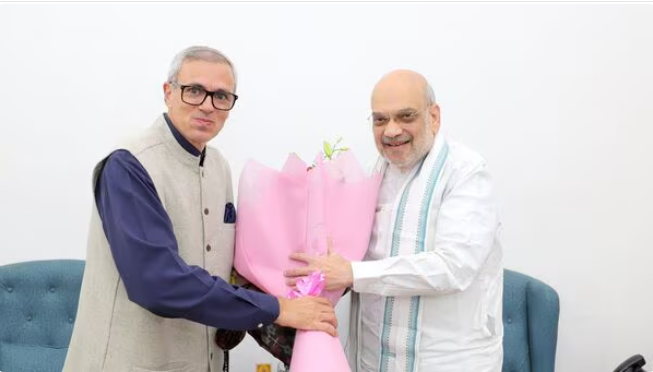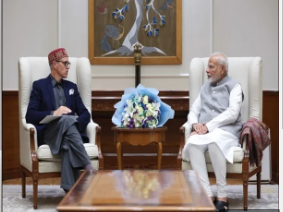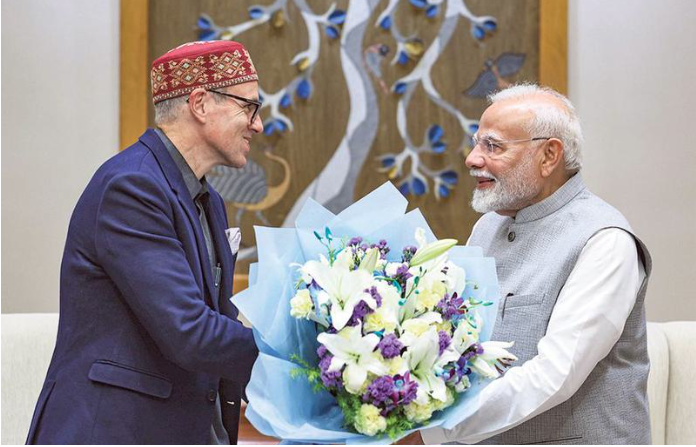The Push for Jammu and Kashmir’s Statehood
Former Chief Minister of Jammu and Kashmir (J&K) and National Conference leader Omar Abdullah recently met with Prime Minister Narendra Modi and senior Union Ministers in Delhi, making a compelling appeal for the restoration of statehood to J&K. This move is part of an ongoing effort by J&K’s political leadership to reinstate the region’s former status and autonomy following the abrogation of Article 370 in 2019. This article analyzes Omar Abdullah’s advocacy, the arguments for statehood, the responses from the central government, and the potential implications for J&K’s future.
Section 1: Background on Jammu and Kashmir’s Current Status
1.1 Abrogation of Article 370 and its Aftermath
In August 2019, the Indian government revoked Article 370, which had provided Jammu and Kashmir with a degree of autonomy. Alongside this, J&K was bifurcated into two Union Territories—Jammu and Kashmir, and Ladakh—ending its status as a state. This move was controversial and widely debated, sparking responses both within India and internationally.
1.2 The Impact of Union Territory Status on J&K
The change in status meant reduced local autonomy, direct governance by the central government, and limited legislative powers. The alteration also impacted local governance, development initiatives, and, in the eyes of some residents, eroded regional identity and self-determination, intensifying calls for statehood restoration.
Section 2: Omar Abdullah’s Advocacy for Statehood Restoration
2.1 A Persistent Voice for Statehood
Omar Abdullah has been a consistent advocate for restoring J&K’s statehood, arguing that it is essential for preserving the political and cultural rights of its residents. His recent meetings are part of a broader campaign aimed at mobilizing both regional and national support for J&K’s statehood.
2.2 Key Points Presented to PM and Union Ministers
In his discussions with the Prime Minister and Union Ministers, Abdullah reportedly focused on several critical arguments:
- Restoration of Political Autonomy: He emphasized that statehood would allow for a more responsive and accountable government, fostering local leadership and decision-making.
- Economic Development: Abdullah highlighted that restoring statehood could improve investor confidence and facilitate economic growth, which has slowed down under the Union Territory administration.
- Strengthening Democracy: He argued that statehood is fundamental to J&K’s democratic structure, as it would allow elected representatives to exercise greater legislative and administrative authority.
 for the more information click on this link
for the more information click on this link
Section 3: Reasons Behind the Push for Statehood
3.1 Addressing Regional Sentiment and Identity
The loss of statehood has impacted regional identity, creating a sense of disenfranchisement among many in J&K. Abdullah’s appeal for statehood is partly motivated by the desire to restore a sense of dignity and political identity among the people of J&K, particularly in the Kashmir Valley.
3.2 Enhancing Administrative Efficiency
Union Territory governance structures, designed for smaller areas, may lack the resources and flexibility required for a region as vast and complex as J&K. Statehood, proponents argue, Omar Abdullah would provide more effective governance through locally-driven administration, better suited to address the region’s unique needs.
3.3 Security and Stability
Abdullah also underscored the importance of political stability in J&K. By providing a platform for democratic engagement and political expression, statehood could contribute to greater stability in a region that has been historically prone to tensions.
Section 4: Government’s Stance on J&K’s Statehood
4.1 Statements from Central Leaders
The central government has stated in the past that J&K’s statehood would be restored at an “appropriate time,” contingent on the region’s security situation and developmental goals. However, Omar Abdullah no definitive timeline has been offered, leaving J&K’s political future uncertain.
4.2 Security Concerns and Roadblocks
The government’s hesitation is partly due to security concerns, Omar Abdullah with some officials arguing that the Union Territory model has helped reduce insurgency and bring development focus to J&K. While these efforts have shown progress, the government is cautious about relinquishing direct control.
4.3 Promises of Gradual Normalization
The government has indicated that gradual normalization, including the restoration of J&K’s statehood, could be considered once certain benchmarks—such as improvements in security and economic growth—are met. This approach suggests a step-by-step model of returning governance powers to local leaders.
Section 5: Political Landscape in Jammu and Kashmir
5.1 Regional Political Parties’ United Demand
The National Conference, People’s Democratic Party (PDP), and other local parties have consistently called for the restoration of J&K’s statehood, presenting a rare display of unity across regional lines. This united front reflects the widespread support for statehood among the local population, Omar Abdullah making it a significant electoral issue.
5.2 Public Sentiment and Expectations
Surveys and local reports indicate that a substantial portion of J&K’s population favors statehood over Union Territory status, associating statehood with greater respect, Omar Abdullah dignity, and autonomy. This sentiment, coupled with a long history of political self-governance, fuels continued calls for restoring J&K’s former status.
5.3 The Role of Political Leaders
Omar Abdullah, along with leaders such as Mehbooba Mufti and others, Omar Abdullah represents the face of this statehood movement. Their efforts have focused on engaging the central government while keeping statehood a focal point of their agendas to rally public support and maintain regional unity.
Section 6: Potential Implications of Restoring Statehood
6.1 Impact on Governance and Bureaucracy
Restoring statehood would necessitate establishing a full legislative assembly and redistributing administrative powers. While this shift would bring greater local governance, Omar Abdullah it would also require reorganizing bureaucratic structures to realign with state-level governance models.
6.2 Economic and Developmental Outcomes
Statehood could boost investor confidence by signaling a return to political stability. It would allow local leaders to craft policies specifically for J&K’s economic needs, addressing unemployment, Omar Abdullah infrastructure, and regional disparities more effectively than under Union Territory administration.  for the more information click on this link
for the more information click on this link
6.3 Influence on Regional Security and Stability
Restoring statehood could improve regional stability by providing local stakeholders with a legitimate political platform and addressing grievances more directly. However, Omar Abdullah it would also require careful handling to ensure that state-level governance does not lead to a resurgence in tensions.
Section 7: Challenges and Counterarguments
7.1 Security Concerns and Counterarguments
Opponents argue that Union Territory status has allowed for better control of security in J&K, Omar Abdullah helping reduce incidents of violence. Some experts suggest that the security gains achieved since 2019 could be jeopardized by a rapid transition back to statehood.
7.2 Economic Viability and Feasibility
There are concerns about the financial and administrative viability of statehood, Omar Abdullah especially as the central government has invested heavily in J&K’s development post-2019. Transitioning back to state governance may require new financial structures to support J&K’s unique needs.
7.3 Addressing Political Divisions
Political divisions between Jammu and Kashmir regions could present a challenge to cohesive statehood governance. Leaders will need to carefully navigate these regional differences to create policies that cater to the diverse needs of J&K’s population.
Section 8: Future Prospects and Next Steps
8.1 Diplomatic and Legislative Pathways
The central government may consider a phased approach, Omar Abdullah allowing J&K to regain legislative powers gradually. This phased transition could allow the central government to assess and address security and administrative challenges while gradually restoring J&K’s autonomy.
8.2 Role of Civil Society and Public Opinion
Civil society’s role in J&K’s future is significant, as public opinion can guide both regional leaders and the central government in their decision-making. Forums, discussions, Omar Abdullah and other channels can help ensure that any path forward aligns with the aspirations of the people.  for the more information click on this link
for the more information click on this link
8.3 Balancing National and Regional Interests
Achieving a balance between national security and regional aspirations will be key in moving forward. A comprehensive statehood restoration plan could address both these concerns, Omar Abdullah laying the foundation for a more stable and prosperous J&K.
Conclusion: The Road to Statehood for Jammu and Kashmir
Omar Abdullah’s meetings with the Prime Minister and Union Ministers represent a pivotal moment in J&K’s journey toward statehood. While the path forward may be fraught with challenges, the widespread support for statehood among J&K’s residents underscores the importance of restoring local governance and addressing regional aspirations. As discussions continue, the central government’s willingness to engage and address these issues could mark a new chapter in J&K’s political and economic future, Omar Abdullah strengthening India’s unity and diversity. ALSO READ:- Washington Sundar’s Spellbinding Performance: India Leaves New Zealand Bamboozled with Spin Mastery 2024




